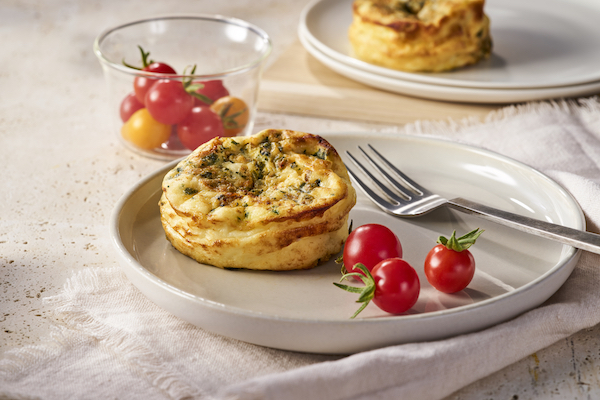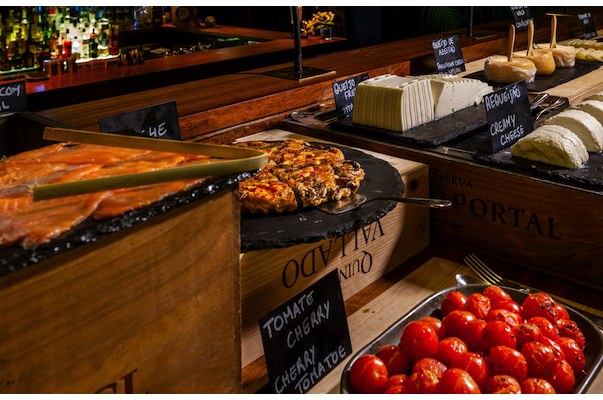The hotel buffet is back. But it’s not back everywhere, and it’s not quite the same as it was pre-2020.
Contributed by Jeanette Hurt
“Breakfast is important to guests, and it’s almost integral, like location and price for the hotels,” said Gregory Miller, vice president of lodging and experiential leisure equity research for Truist Securities. “If breakfast ranks up above room experience, maybe the buffets are more meaningful than the bed. So, there’s really an incentive to put a lot of focus into the buffet experience because it appears that customers really care about it.”
That said, in a COVID-informed and hygiene-conscious world, what will become of the hotel buffet? It seems to depend on the hotel operator’s perspective.

Marriott Bonvoy has announced a new, rebooted breakfast concept at more than 150 hotels in North America, and its research showed buffets are okay. “The new complimentary breakfast program was developed and driven by customer feedback and insights,” said Diane Mayer, vice president and global brand leader for Classic Select Brands at Marriott. “Through our customer research, we learned that many of our guests expected a hot breakfast buffet to return, and over 72% of those surveyed felt comfortable eating at a buffet again. Furthermore, breakfast continues to be a top decision maker for our guests when it comes to selecting a hotel.”
The complimentary hot breakfast program was rolled out in Residence Inn, SpringHill Suites, Fairfield and TownePlace Suites, and a new breakfast program was also unrolled at Aloft Hotels that caters to the socially conscious and transient lifestyle of the next-Gen traveler, Mayer said.
Customers do really care about buffets, said João Martins, regional operations manager for Pestana Hotel Group in Portugal, who is in charge of Pestana Hotels & Resorts, Pestana Collection Hotels and Pestana CR7 Lifestyle Hotels. “Almost two years ago, when we started with this pandemic situation, the law said that the buffet was not allowed, and then some weeks after that first decision, they decided that you can have a buffet, but you need to serve the customers, and they had to book a time for their breakfasts,” he said.
Those first customers, Martins said, were really disappointed. “They were used to coming to breakfast at what time they wished, and in some other cases, customers felt it was a huge limitation to ask them (staff) to serve them,” he said.
Because it was a la carte, served to the tables, there was more waste, Martins added. “Customers felt bad because they didn’t always like everything that was served,” he said.
Customer feedback and the evolution of the pandemic allowed Pestana to reevaluate their buffets and their offerings. So, the buffet evolved, and customers are more satisfied now than ever, Martins said. “One thing we found is that customers now prefer less varieties but better quality, and that is something that COVID allowed us to re-think.”
“In the past, we would have had six to eight types of juices,” Martins said. “Now, we have only two or three, but they are freshly squeezed juices. Before the pandemic, customers were looking to have 10 kinds of cereal at breakfast, and nowadays, they want less variety but better quality.”
Customers, he said, are looking for fresh, healthy and locally made items. “Before, we need to have 10 kinds of pastries at breakfast, but now, if we have four and one of them is a local specialty, that is all we need,” Martins said. “Customers are paying attention to the storytelling and the richness of knowledge.”

Following the onset of the pandemic, the Alma Resort Cam Ranh in Vietnam did away with its breakfast buffet and began offering everything a la carte. “We felt that, at the time, removing the buffet was in the best interests of protecting our guests, staff and community from the threat of COVID-19,” said Herbert Laubichler-Pichler, managing director of the resort. “However, upon further consideration, we do see a place for a buffet experience at our resort amid the new normal, in the form of a semi-buffet, albeit with heightened safety precautions.”
The Alma Resort Cam Ranh was temporarily closed, amidst a flare-up of the virus in late 2021, but the resort had plans to reopen in January 2022. “Upon reopening, we will initially offer only an a la cart breakfast at our Atlantis Beachfront restaurant to keep our costs and risks low, but this may change, depending on the number of guests,” Laublichler-Pichler said. “As our guest numbers increase, we plan to offer a semi-buffet breakfast at our Alma Food Court.”
The semi-buffet combines both self-serve selections, as in a traditional buffet, but more, fresh-to-order cooking stations, and it is one possible future for hotel buffets.
The semi-buffet, Laublichler-Pichler said, has more advantages than a traditional buffet in that the food is cooked fresh to order for the guests, there aren’t as many touch points, and food waste is reduced, which also controls the costs.
“The semi-buffet will be a scaled back affair compared to our previous, extensive breakfast buffet,” said Alma Resort Executive Chef Ingo Stöneberg. “The semi-buffet will only have a limited selection of the items, and there will be an increased focus on the guest ordering freshly prepared dishes of their choice. We will have different food stations at our food court with individual cooking areas.”
Design, service revamps
At Marriott Bonvoy, the breakfast buffet has been redesigned. “Service has become more personalized with individually packaged items and more attended food stations, as well as specialty bars,” Mayer said. “The use of non-traditional event spaces such as outdoor venues are more popular. These enhancements, along with heightened customer communication, are here to stay, supporting our efforts to create lasting and memorable meeting and event experiences.”
Buffets, Mayer said, will continue to be popular. “Buffets for meetings and events continue to be one of the most effective ways to cater to attendees and can be served single-sided or double-sided to offer a wide variety of options, as well as give us the opportunity to personalize and customize.”
Before COVID-19, the Peninsula Hotel in Chicago hosted massive holiday buffets, serving upwards of 700 to 800 people, said Baasim Zafar, executive chef for the Peninsula Hotel in Chicago. “It had up to 10 different stations, and seatings starting around 10 a.m. and ending at 9:30 p.m.”

After lockdown, the Peninsula Hotel revamped their buffet to look at the quality and personal service. Instead of having guests go to different stations for everything from caviar to omelets, their first buffet, which was held in May for Mother’s Day in 2021, had most items moved to an a la carte menu. Guests could still order as much as they wanted – and the buffet portion was just the desserts.
Today, that approach has evolved to a different model of service. “We wanted to give the guests a better experience,” Zafar said.
To do that, guests are seated, and then they are given a menu of starters – six salads, two soups and three fish dishes. “They can order as many times as they want, but they are made to order,” he said. “There’s nothing like having a fresh piece of fish prepared for you, and the quality is way better than what could be served at the buffet.”
The rest of the meal is served at stations, and each station has an attendant, serving guests and explaining how each dish is made and where the ingredients are sourced. The buffet also had a sell-out of 360 diners for each holiday. “Guests have given us fantastic feedback,” Zafar said. “This is definitely a better experience.”
“It is overall better service,” Zafar added. “Now, we have more interaction with guests, and we are better at replenishing the buffet, and our food waste is drastically down. We are also able to bring out dishes much fresher.”
At the Marriott, food waste is going to be a focus, as well, Mayer said. “Moving forward, there will be a large focus on food waste reduction, especially in meetings and events.”
For meetings and events, the Peninsula Hotel works directly with each client. For business dinners, a lot of clients want a combination of soups and salads served a la carte, and then the buffet served for the dinner. Depending on the group or the client, the hotel can offer extra safety protocols to match their needs.
As of January 3, 2022, the city of Chicago requires attendees to show proof of vaccination to events where food and beverage will be served.
Wedding dinners are often served a la carte at the Peninsula, but wedding breakfasts are often served in a buffet form with the same model as the holiday brunches. “We have gotten very good feedback,” Zafar added.
